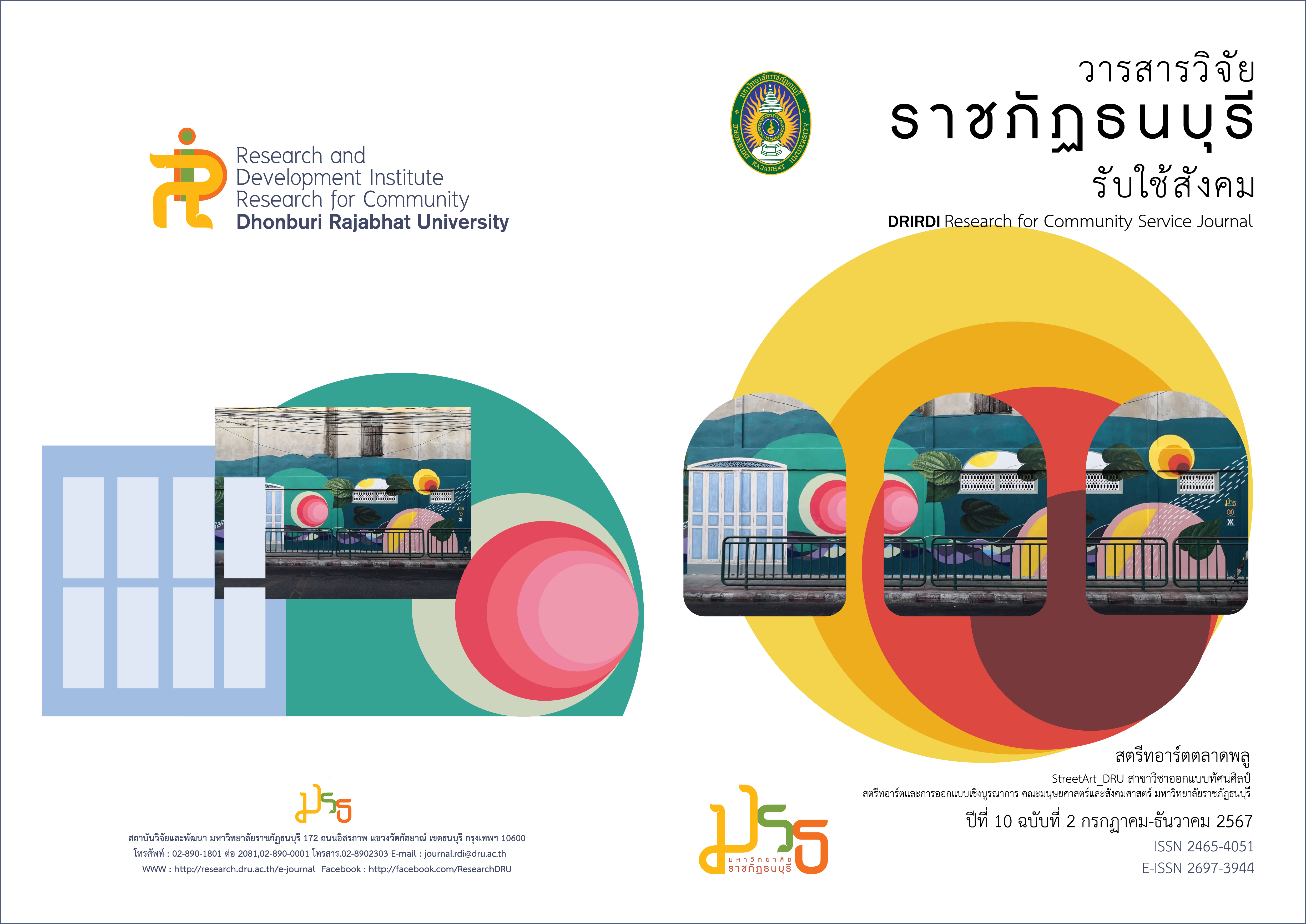ผลของโปรแกรมการจัดการความเครียดเชิงพุทธของพนักงานดูแลผู้สูงอายุ ในศูนย์ดูแลผู้สูงอายุ
คำสำคัญ:
คำสำคัญ : โปรแกรมการจัดการความเครียด, พนักงานดูแลผู้สูงอายุบทคัดย่อ
การวิจัยนี้มีวัตถุประสงค์ 1) เพื่อศึกษาระดับความเครียดของพนักงานดูแลผู้สูงอายุ ในศูนย์ดูแลผู้สูงอายุ 2) เพื่อสร้างโปรแกรมการจัดการความเครียดเชิงพุทธของพนักงานดูแลผู้สูงอายุ ในศูนย์ดูแลผู้สูงอายุ 3) เพื่อศึกษาผลการใช้โปรแกรมการจัดการความเครียดเชิงพุทธของพนักงานดูแลผู้สูงอายุ ในศูนย์ดูแลผู้สูงอายุ งานวิจัยครั้งนี้เป็นการวิจัยกึ่งทดลอง โดยใช้เครื่องมือการวิจัยคือแบบประเมินระดับความเครียดของกรมสุขภาพจิต (SPST-20) และโปรแกรมการจัดการความเครียดเชิงพุทธที่ผ่านการตรวจสอบความเหมาะสมจากผู้ทรงคุณวุฒิ จำนวน 5 ท่าน ได้คะแนน 0.96 แปลว่าเหมาะสม ประชากรศึกษาคือพนักงานดูแลผู้สูงอายุ จำนวน 59 คน นำผู้ที่มีความเครียดในระดับสูง 20 คน และเครียดในระดับรุนแรง 6 คน รวม 26 คน และทำการสุ่มอย่างง่ายเพื่อให้ได้มา จำนวน 14 คน เข้ากลุ่มทดลอง วิเคราะห์ข้อมูลโดยใช้สถิติเชิงพรรณนา แจกแจงความถี่ ร้อยละ ค่าเฉลี่ย และส่วนเบี่ยงเบนมาตรฐาน เปรียบเทียบคะแนนก่อนและหลักการทดลอง และการติดตามผลหลังการทดลองผ่านไปแล้ว 1 เดือน โดยการวิเคราะห์ข้อมูลเชิงคุณภาพ การวิเคราะห์เนื้อหา และการสร้างข้อสรุปแบบอุปนัย
ผลการศึกษาพบว่า 1) ความเครียดของพนักงานดูแลผู้สูงอายุ ในศูนย์ดูแลผู้สูงอายุ ในภาพรวมอยู่ในระดับปานกลาง คะแนนเฉลี่ย 41.14 2) ผลการสร้างโปรแกรมการจัดการความเครียดเชิงพุทธ ประกอบไปด้วย 8 กิจกรรม ได้แก่ 1) เมื่อฉันและเธอมาเจอกัน 2) Finding to Heart 3) สายน้ำแห่งชีวิต 4) ปรับเข็มทิศชีวิตไม่เครียด 5) ชาภาวนา 6) พบธรรมนำใจ 7) อยู่อย่างไรให้มีความสุข และ8) ลมหายใจสลายเครียด ได้คะแนนความเหมาะสมจากผู้ทรงคุณวุฒิ 0.96 3) ผลจากการทดลองตามโปรแกรมการจัดการความเครียดเชิงพุทธหลังการทดลองความเครียดของพนักงานดูแลผู้สูงอายุลดลง อย่างมีนัยสำคัญทางสถิติที่ระดับ .05 และพบว่าพนักงานดูแลผู้สูงอายุมีสุขภาพจิตดีขึ้น เข้าใจถึงสภาะวะอารมณ์และเกิดการมีสติ มีสมาธิ มีความเมตตา เข้าใจถึงสภาวะการเปลี่ยนแปลงที่เกิดขึ้น เกิดความคิดเชิงบวกและเกิดการพัฒนาตนเองในการทำงานและสามารถจัดการกับความเครียดที่เกิดขึ้นได้ดี
เอกสารอ้างอิง
กรมสุขภาพจิต กระทรวงสาธารณสุข. (2541). ประชุมวิชาการกรมสุขภาพจิต ครั้งที่ 4 ระหว่างวันที่ 7-9 กันยายน. สืบค้นเมื่อ 4 พฤษภาคม 2567, จาก https://dmh.go.th/abstract/details.asp?id=1886.
กัญนิกา อยู่สำราญ. (2565). ความเครียดและการเผชิญความเครียดของผู้ดูแลผู้สูงอายุที่มีภาวะพึ่งพิง อำเภอเมือง จังหวัดนครราชสีมา. วารสารศูนย์อนามัย ที่ 9. 16 (1), น. 1-16.
ชัยฒศักดินนท์ สงค์จันทร์. (2564). ผลของโปรแกรมกลุ่มพัฒนาตนเชิงพุทธกับการฝึกสมาธิแบบอานาปานสติ ต่อความเครียดของพนักงานเอกชนแห่งหนึ่ง. วิทยานิพนธ์หลักสูตรปริญญาพุทธศาสตรมหาบัณฑิต สาขาวิชาจิตวิทยาชีวิตและความตาย มหาวิทยาลัยมหาจุฬาลงกรณราชวิทยาลัย.
ชำนิศาสตร์ รัตนาภรณ์. (2562). แนวโน้มของภาวะเครียดและปัจจัยที่เกี่ยวข้องของผู้ดูแลผู้สูงอายุ. วิทยานิพนธ์วิทยาศาสตรมหาบัณฑิต สาขาวิชาสุขภาพจิต จุฬาลงกรณ์มหาวิทยาลัย.
ชาลินี สุวรรณยศ. (2563). การลดความเครียดในผู้ดูแลผู้ที่เป็นโรคสมองเสื่อม. วารสารการพยาบาลจิตเวชและสุขภาพจิต. 34 (2), น. 1-14.
ณัฐธัญญา ประสิทธิ์ศาสตร์. (2561). ผลของโปรแกรมเสริมสร้างแรงจูงใจภายในต่อทักษะการจัดการความเครียด. วิทยานิพนธ์พยาบาลศาสตร์มหาบัณฑิต สาขาวิชาการพยาบาลจิตเวชและสุขภาพจิต คณะพยาบาลศาสตร์ มหาวิทยาลัยธรรมศาสตร์.
ดวงเดือน ศาสตรภัทร และคณะ. (2564). ปัจจัยที่ส่งผลต่อคุณภาพชีวิตของผู้ดูแลผู้สูงอายุ, วารสารวิชาการศรีปทุม ชลบุรี. 18 (2), น. 5.
บริการสถิติข้อมูล. (2565). กรมการปกครอง กระทรวงมหาดไทย. สืบค้นเมื่อ 18 มีนาคม 2566, จาก https://stat.bora.dopa-go.th/new_stat/webPage/statByAgeMonth.php.
ปวีณา ทักษิณาเจนกิจ. (2564). ปัจจัยที่มีความสัมพันธ์ต่อความเครียดในผู้ดูแลผู้มีภาวะสมองเสื่อมหรือภาวะพึ่งพิง. วิทยานิพนธ์สาขาวิชาพยาบาลศาสตร์ คณะพยาบาลศาสตร์ จุฬาลงกรณ์มหาวิทยาลัย.
พิเศษ โพพิศ. (2563). การสร้างสรรค์กิจกรรมศิลปะเพื่อลดความเครียดในเด็กจากการเรียนออนไลน์. นครปฐม. มหาวิทยาลัยศิลปากร.
พิศิษฐ์ ชื่นแจ้ง. (2564). ปัจจัยที่ส่งผลต่อความเครียดของผู้ดูแลคนพิการทางการเคลื่อนไหวหรือทางร่างกายระดับติดเตียง จังหวัดสุโขทัย. วิทยานิพนธ์หลักสูตรสาธารณสุขศาสตรมหาบัณฑิต คณะสาธารณสุขศาสตร์ มหาวิทยาลัยนเรศวร.
มณีรัตน์ ชาวบล และคณะ. (2565). ปัจจัยทำนายภาวะซึมเศร้าของผู้ดูแลผู้สูงอายุที่มีภาวะพึ่งพิง. วารสารพยาบาลศาสตร์ . 40 (3), น. 91-102.
วันทนา เนาว์วัน และคณะ. (2563). การจัดการความเครียดและปัจจัยที่เกี่ยวข้องกับการจัดการคุณภาพชีวิตในการทำงาน. วารสารวิทยาการจัดการปริทัศน์, 22 (1), น. 224-230.
ศูนย์วิจัยกสิกรไทย. (2564). สังคม สูงอายุ...แบบสมบูรณ์ คนไทยพร้อมแล้วหรือยัง. สืบค้นเมื่อ 18 มีนาคม 2566,
จาก https://www.kasikornresearch.com/th/analysis/k-social-media/Pages.
สุดาสินี สุทธิฤทธิ์. (2564). ความเครียดของผู้ดูแลผู้สูงอายุกลุ่มติดเตียง จังหวัดสุราษฎร์ธานี, วารสารวิชาการแพทย์เขต 11, 35 (2), น. 1-9.
สุสารี ประคินกิจ. (2562). ผลของโปรแกรมสร้างสุข ผ่อนคลายความเครียดผ่านแอปพลิเคชั่น ต่อ ความเครียด ความสุขคุณภาพชีวิตของผู้ดูแลผู้ป่วยจิตเภทในชุมชนเมือง. ผลงานดี วิชาการเด่น สมคุณค่าพยาบาลไทย ครั้งที่ 3 : การดูแลผู้สูงอายุในยุคดิจิทัล (วันที่ 24-26 เมษายน), น. 225.
สุวรรณา เชียงขุนทด. (2561). การพัฒนาโปรแกรมการจัดการความเครียดตามแนวพุทธจิตวิทยาสำหรับนักศึกษาคณะพยาบาลศาสตร์ มหาวิทยาลัยสยาม. ดุษฎีนิพนธ์หลักสูตรปริญญาพุทธศาสตรดุษฎีบัณฑิต. สาขาวิชาพุทธจิตวิทยา. มหาวิทยาลัยมหาจุฬาลงกรณราชวิทยาลัย, น. 117-121.
สุริยา ฟองเกิด. (2562). ความต้องการด้านการช่วยเหลือดูแลสุขภาพของญาติผู้ดูแลผู้สูงอายุ ที่มีภาวะพึ่งพิงในชุมชน. วารสารมนุษยศาสตร์และสังคมศาสตร์ มหาวิทยาลัยราชภัฏอุดรธานี, 8 (2), น. 93-108.
อรทัย วงค์อินอยู่ และคณะ. (2562). การศึกษาความเครียด และภาระของผู้ดูแลผู้ป่วยโรคหลอดเลือดสมองในชุมชน. วารสารการพยาบาล สุขภาพ และการศึกษา, 2 (1), น.40-49.
Today. (2564). นักวิชาการเตือนปี 65 ไทยเตรียมพบสึนามิสังคมสูงอายุ พร้อมแนะรัฐและประชาชนเร่งปรับตัว. สืบค้นเมื่อ 18 มีนาคม 2566, จาก https://workpointtoday.com/thai-agingsociety-65/.
ไฟล์ประกอบ
เผยแพร่แล้ว
รูปแบบการอ้างอิง
ฉบับ
ประเภทบทความ
สัญญาอนุญาต
ลิขสิทธิ์ (c) 2024 มหาวิทยาลัยราชภัฏธนบุรี

อนุญาตภายใต้เงื่อนไข Creative Commons Attribution-NonCommercial-NoDerivatives 4.0 International License.
บทความที่ได้รับการตีพิมพ์เป็นลิขสิทธิ์ของ มหาวิทยาลัยราชภัฏธนบุรี
ข้อความที่ปรากฏในบทความแต่ละเรื่องในวารสารวิชาการเล่มนี้เป็นความคิดเห็นส่วนตัวของผู้เขียนแต่ละท่านไม่เกี่ยวข้องกับมหาวิทยาลัยราชภัฏธนบุรีและบุคลากรท่านอื่นๆในมหาวิทยาลัยฯ แต่อย่างใด ความรับผิดชอบองค์ประกอบทั้งหมดของบทความแต่ละเรื่องเป็นของผู้เขียนแต่ละท่าน หากมีความผิดพลาดใดๆ ผู้เขียนแต่ละท่านจะรับผิดชอบบทความของตนเองแต่ผู้เดียว







